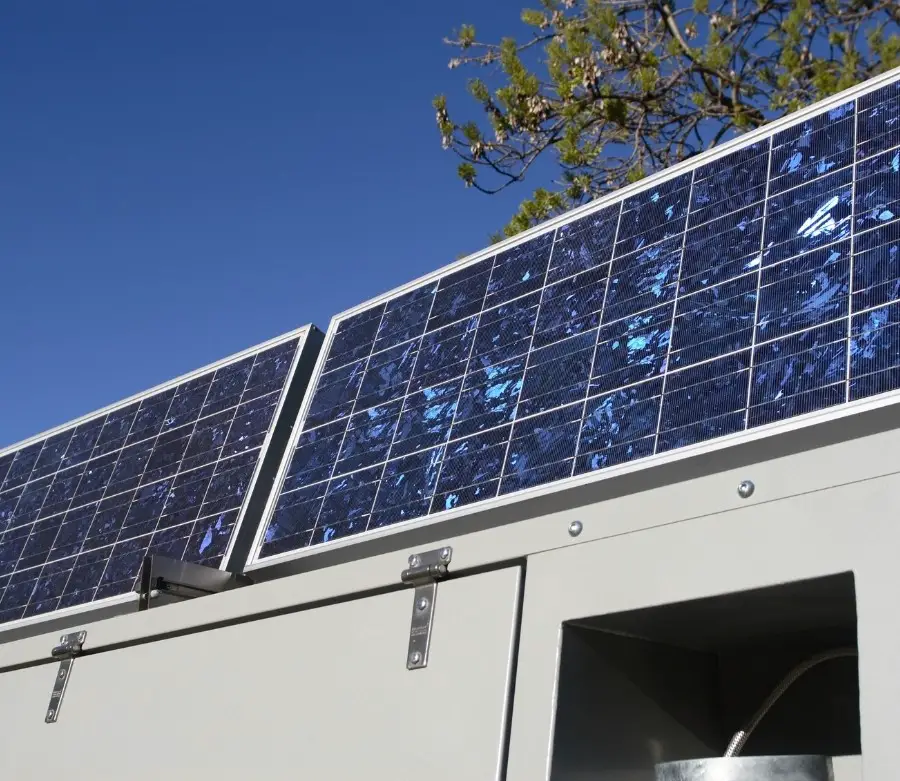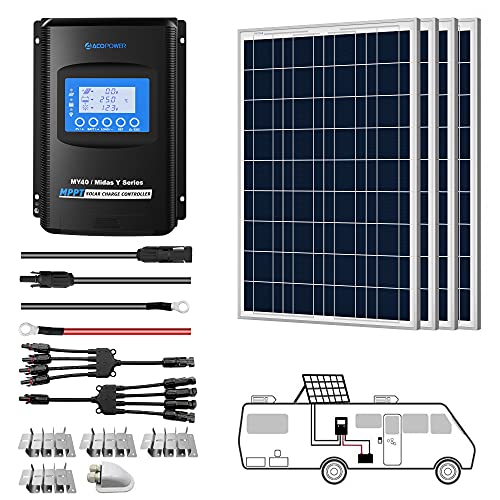
For dependable power with little hands-on involvement after installation, purchasing quality equipment from the get-go is paramount.
Poor-quality solar panels will suffer damage easily, fail to produce the power you need, and be disappointing at best.
High-quality solar panels will perform reliably, last for years with little maintenance, and be backed by a lengthy warranty.
The best option overall? That would be the Renogy 400 Watt Solar Panel Kit.
- 【Wide Application】1600Wh daily output depends on the 4 hours sunlight availability.This panel is...
- 【Excellent Performance】22% High solar cell efficiency. Corrosion-resistant aluminum frame for...
With a high-efficiency, compact solar cell supported by a corrosion-resistant aluminum frame, you can count on steady, reliable power for years to come.
What’s more, the MPPT Charge Controller operates at a 97% peak efficiency, so you know you’re getting the most for your money and can depend on maximum productivity – that equates to excellent value.
Best Overall 400 Watt Solar Panel Kit
Renogy 400 Watt 12 Volt Solar Starter Kit
- 【Wide Application】1600Wh daily output depends on the 4 hours sunlight availability.This panel is...
- 【Excellent Performance】22% High solar cell efficiency. Corrosion-resistant aluminum frame for...
The Renogy 400 Watt 12 Volt Solar Starter Kit is the perfect choice for people who are just getting started with solar energy.
Unlike conventional gas generators, this solar kit recharges your batteries quietly, meaning that you can experience the great outdoors without additional noise.
The kit is ranked the best overall 400 watt solar panel kit mainly because of its grid independence and quiet power production.
It is also a perfect choice for off-grid use in RVs, boats, trailers, cabins, and sheds.
Pros:
- Quiet power production.
- Great choice for anyone with no experience.
- Durable.
- Has a tempered glass coating that is resistant to storms and heavy rain.
- Easy to set up for those new to solar.
Cons:
- Some additional hardware may be necessary.
- More expensive than polycrystalline solar kits.
Other 400 Watt Solar Panel Kits To Consider
Check out the following list of other 400 watt solar panel kits that can equally pass as excellent RV solar kits. They will all meet your budget and power needs.
ACOPOWER 400 Watts 12/24 Volts Monocrystalline Panel Solar RV Kit
- Set for 400W Solar Panel: 4PCS 100W mono solar panel collocation with 30A MPPT waterproof solar...
- High Performance:Our ACOPOWER 100Watt mono Solar Panel designed with the grade A+ solar cells inside...
The ACOPower 400 Watts Monocrystalline Solar Panel Kit contains four ACOPower 100-watt monocrystalline panels that connect in a parallel or a series.
The parallel connection is for charging 12V batteries, while the series connection is designed for charging 24V batteries.
The system also comes with a 25-year warranty on the panels and a one-year warranty on other components in the package.
Pros:
- It has a 25-year power output warranty on all its panels and a one-year warranty on other kit components.
- Suitable for use in RVs, homes, boats, cabins, and remote power use.
- The solar charge controller has adjustable settings.
- Its negative grounding design guarantees no less than 99.5% charging efficiency.
- The system is lightweight and durable.
Cons:
- Like most other monocrystalline solar panels, it is expensive.
ACOPOWER 400 Watts 12/24 Volts Polycrystalline Panel Solar RV Kit
- [Solar Starter Kit] 400W solar panel kit is fully equipped, and the necessary accessories from input...
- [Ideal Choice for Permanent Installation] Advanced laminated technology and long-lasting ETFE...
This compact package can charge virtually any battery thanks to its four 100-watt polycrystalline panels.
The MPPT Solar Charge Controller that comes with the panel helps you remotely track and change the panel’s settings.
This kit is complete with an easy installation and a 25-year guarantee. It has enough juice for most RVers’ everyday needs.
The simple-to-use system is available at the 500-watt, 600-watt, and 800-watt range if you want to go all out.
Pros:
- The system works well with 12- and 24-volt batteries.
- Generates enough power for most daily activities.
- The 25-year guarantee covers you in the event of a breakdown while on the road.
- You can upgrade the system with other ACOPower for more power.
- You can adjust the panel’s voltage, storage, and more remotely.
Cons:
- You need a lot of roof space for charging in transit.
- It may not hold up as well in bad weather as some panels.
HQST 400 Watt 12 Volt Monocrystalline Solar Panel Kit
- 【Installation Ready】The kit includes 4 pack 100 Watt 12 Volt Monocrystalline Solar Panel, 40 Amp...
- 【Versatile】Used in various off-grid applications that include 12 and 24 volts arrays, water...
This solar panel kit was designed specifically for users who are new to solar power.
It has Z-brackets and predrilled holes on the panels for mounting and securing, making it easy and convenient to install.
The system is usable in various off-grid applications, including 12- and 24-volt arrays, signaling systems, water pumping systems, and other off-grid applications, such as RVs, boats, cabins, trailers, and sheds.
Pros:
- It has a durable, corrosion-resistant aluminum frame that makes it suitable for outdoor use.
- Because of its versatility, you can use it for various grid applications, including 12- and 24-volt arrays.
- Best fitted for LiFePO4 battery.
- The kit is installation ready.
- Suitable for off-grid applications like RVs, cabins, and home back-up power.
Cons:
- It is expensive.
Buyer’s Guide – What To Consider When Buying Solar Panel Kits
Purchasing a home solar-power device may be a thrilling experience, but don’t be fooled by advertisements.
Since it’s a significant investment and one you’ll be sticking with for a long time, make sure you concentrate on the essential aspects of your purchase.
Here are a few suggestions on what to check for while buying a solar panel kit.
Efficiency
A power inverter sits between your solar panels and your appliances and transforms DC energy from the panels into AC electricity in your house.
Not all solar inverters are created alike. Inverter efficiency has a significant effect on how long the system takes to compensate for itself.
Before you buy a solar-inverter system, check the performance. Obviously, the higher the inverter’s performance, the better!
With high-quality equipment, during the conversion from DC to AC, less energy is lost as heat. Be careful with general-type brands.
Decide on the Panel Types
In the past, if you only had a small amount of roof area, you had to invest in extremely effective (and costly) monocrystalline solar panels.
With advancements in polycrystalline panel technology, and perhaps some thin-film innovations, this is increasingly changing.
Even if you have plenty of roof area, you should still think about panel size versus output.
Filling the roof with inefficient panels would limit the capacity to install more panels in the future, and it will not maximize the space’s power output.
It’s also worth remembering that no solar panel technology can generate significant amounts of power in full shade or complete darkness.
Learn all about the differences between monocrystalline and thin-film panels.
Solar Panel Mounting
Check to see whether the roof, ground mounting, or monitoring device is engineer approved for your location.
For example, if you live in a cyclone-prone location, ensure the brackets and mounting systems are also cyclone rated.
Quality systems have wind certifications. After all, you don’t want the battery to go off in the middle of a hurricane.
Some vendors skimp on the mounting device, which is a critical factor. Ask about warranty plans and wind certification, and obtain copies of pertinent documents.
Have Realistic Price Expectations
You may notice low-standard equipment and installation will not work quite as well if you pay significantly less than several other comparable-size systems quoted.
Quality equipment and installation are not cheap, and you always get what you pay for, just like with other purchases.
Check out the warranty and components, as well as the installation company.
Although big, well-established firms may pass on significant cost reductions due to their purchasing capacity, smaller businesses often save expenses by cutting essential corners.
Length of Manufacturer’s Warranty
Take notice of the warranties that the vendor offers.
If the vendor is trustworthy and the panels have a lengthy warranty duration (at least 25 years), you should expect the solar device to last a long time, long enough to compensate for itself and generate a profit.
However, for the warranty to be honored, the seller must always be in business. As a result, be wary of labels that don’t have a proven track record.
Related Questions:
Can You Add More Solar Panels to an Existing System?
Yes, you can add more solar panels to your existing system. If you want to start saving any of the energy you generate, you may also install home batteries.
You may need to upgrade your solar system’s inverter to one that can accommodate the extra current supplied by your newly extended system.
What Can I Power With 400 Watt Solar?
A 400-watt solar system can produce as much as 120 – 128 amps per day, which is enough to power an energy-efficient fridge, charge laptops, and power a TV.
It also recharges several small devices including phones, kindles, and tablets.
Do Solar Panels Damage Your Roof?
Solar panels do not inherently cause damage to your roof. However, the method of installation may contribute to whether or not your roof gets damaged.
Installation entails nailing, bolting, and strapping panels to the house. Usually, these nails and bolts are pushed straight through the roof and the attic or ceiling.
Unfortunately, the holes that result can lead to leaks over time. The risk of water damage and mold development increases dramatically where there is unexpected rainfall.
On that note, grinding and hammering during solar panel installation would almost certainly destroy your roof tiles.
Therefore, it’s advised that you use a non-destructive installation method to prevent damage to your roof.
Do Solar Panels Have to Be on the Roof?
While solar panels are commonly installed on roofs, this is not the only option.
In fact, a ground-mounted solar panel can provide more energy per panel than a rooftop array.
Since solar panels are not dependent on the roof, you can set ground-mounted solar panels at the perfect angle to maximize energy generation.
Conclusion
When it comes to long-term power solutions for your RV, vacation retreat, or home use, you really don’t want to skimp on quality.
Overall, the best option for a 400-watt solar panel kit is the Renogy 400 Watt 12 Volt Starter Kit.
Maximum Power Point Tracking Charge Controller (MPPT). 97% efficiency.
Expandable up to 800 watts. Quiet, reliable power production. Installation hardware included. Perfect for beginners.
It’s simply a great all-around choice for those starting from scratch with little to no experience!
Source:
https://www.energymatters.com.au/panels-modules/thin-film-monocrystalline/




